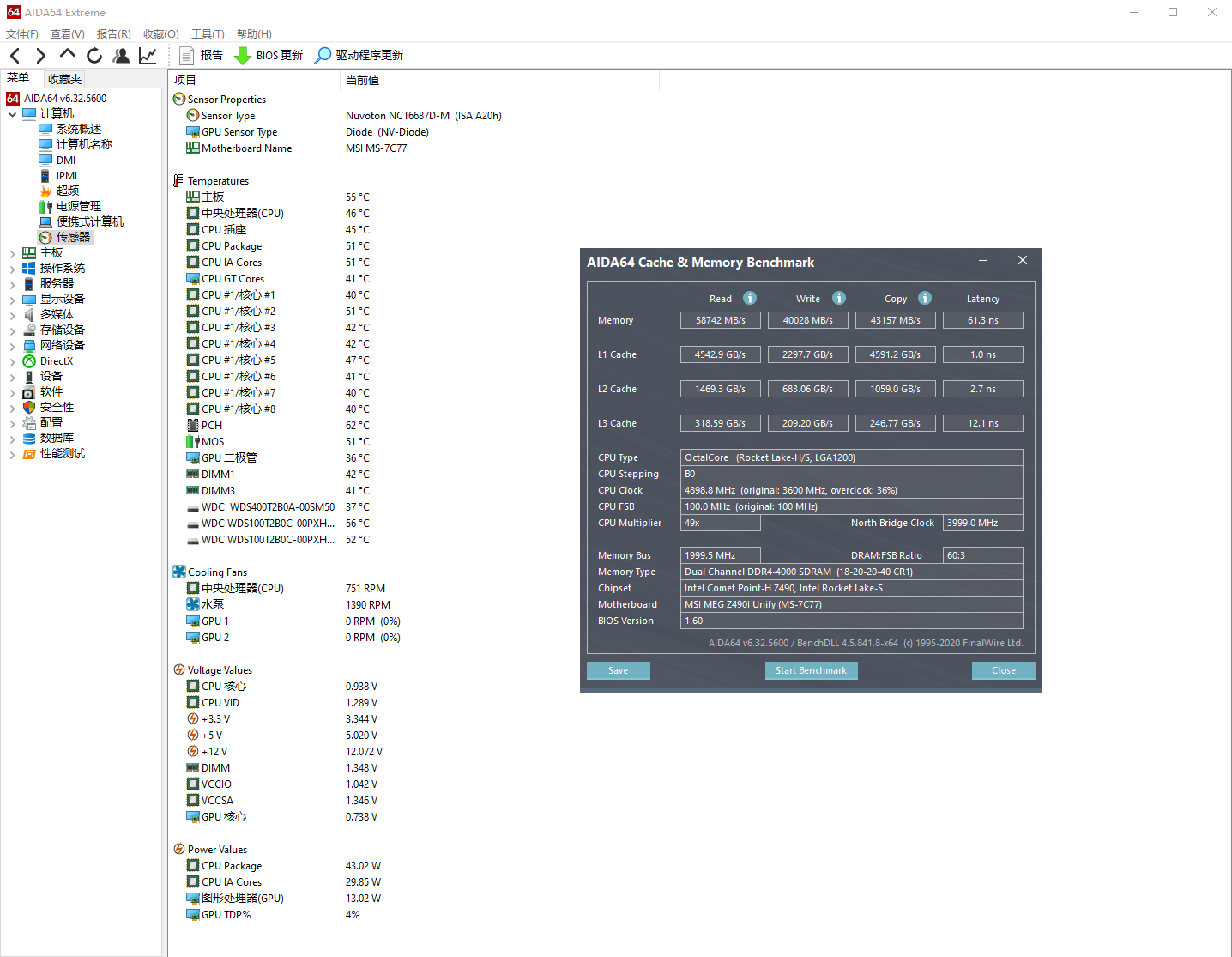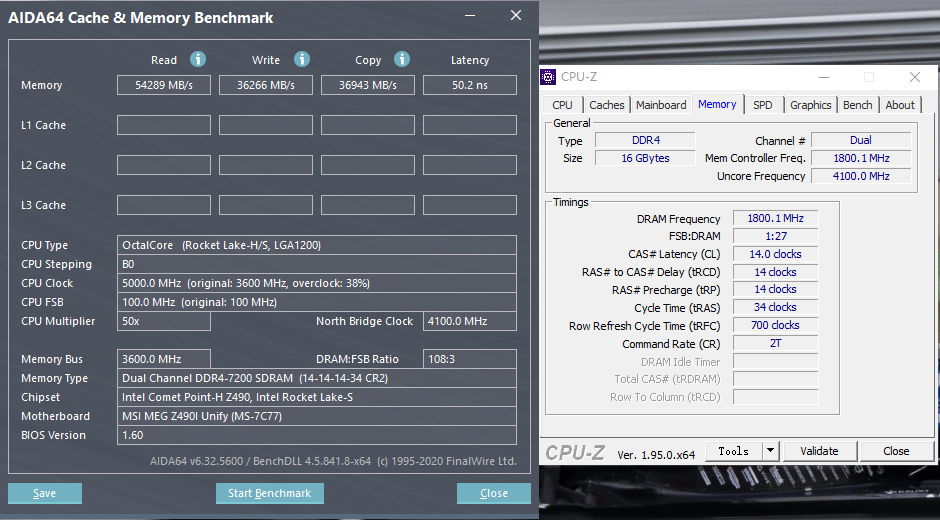Intel Imitates AMD's Memory Overclocking Approach With Rocket Lake CPUs
Get Tom's Hardware's best news and in-depth reviews, straight to your inbox.
You are now subscribed
Your newsletter sign-up was successful
Intel's 11th Generation Rocket Lake processors aren't due until March 30. However, some retailers are already shipping out orders. One user from the Chiphell forums has gotten his hands on a retail Core i7-11700K, and it would appear that Intel is using a similar memory overclocking concept as AMD's Infinity Fabric Clock (FCLK), but with Rocket Lake chips.
If you're not familiar with AMD's Ryzen processors, many of which sit on our best CPUs list, the FCLK dictates the frequency of the Infinity Fabric, which serves as an interconnect across the chiplets. Adjusting this value allows you to hit higher memory frequency overclocks. By default, the FCLK is synchronized with the unified memory controller clock (UCLK) and memory clock (MEMCLK). Obviously, you can run the FCLK in asynchronous mode, but doing so will induce a latency penalty that negatively impacts performance.
Since Rocket Lake isn't officially out yet, we're not completely sure how Intel's portrayal of the FCLK memory overclocking will work. The BIOS screenshot shows two operational modes for the CPU IMC (integrated memory controller) and the DRAM clock on MSI's Z490I Unify. Apparently, Gear 1 runs both in a 1:1 ratio, while Gear 2 puts them in a 1/2:1 ratio. It's similar to how the FCLK works on Ryzen processors.
According to the author of the forum post, his retail Core i7-11700K seems to hit a wall at DDR4-3733, suggesting that DDR4-3733 is the limit at which Rocket Lake's IMC can run in a 1:1 ratio with the memory clock. In retrospect, the majority of AMD's Zen 2 processors scale to a 1,800 FCLK (DDR4-3600) with some samples hitting a 1,900 MHz FCLK (DDR4-3800). If Rocket Lake has the same limits, it's going to lose points since AMD's latest Zen 3 processors have peaked as high as a 2,000 MHz FCLK (DDR4-4000) before breaking synchronous operation.


It's too soon to pass judgement whether DDR4-3733 is a hard cap that's built into the Rocket Lake silicon itself or it's merely a product of an early and unoptimized microcode. We should point out that the user did his testing on a MEG Z490I Unify motherboard so a proper firmware is required to make Rocket Lake operate properly. The Chiphell forum user provided some RAM benchmarks that reportedly shows the performance impact.
With a DDR4-4000 memory kit with 18-20-20-40 1T timings in asynchronous mode, the user got a latency of 61.3 nanoseconds in AIDA64. Switching over to a DDR4-3600 memory that has 14-14-14-34 2T timings allowed him to decrease the latency to 50.2 nanoseconds, which represents a 18.1% reduction. However, we have to take certain points into consideration. For one, the DDR4-4000 memory kit obviously has very sloppy timings that help contribute to higher latency. Furthermore, the user evidently overclocked the Core i7-11700K's uncore frequency to 4,100 MHz on the DDR4-3600 run so that probably skewed the results in its favor as well.
We'll have to wait until the Rocket Lake processors are available to investigate the matter thoroughly. So far, a DDR4-3733 limit certainly doesn't bode well for Rocket Lake, especially when some of the really pricey Z590 motherboards are advertising memory support above DDR4-5000. In all fairness, Rocket Lake only natively supports memory up to DDR4-3200 so anything higher is technically overclocking in Intel's book.
Get Tom's Hardware's best news and in-depth reviews, straight to your inbox.

Zhiye Liu is a news editor, memory reviewer, and SSD tester at Tom’s Hardware. Although he loves everything that’s hardware, he has a soft spot for CPUs, GPUs, and RAM.
-
Gurg A word of caution. Semantics can matter especially in technology and patent issues. "Copies" used in the headline has an entirely different connotation and meaning than adopts or adapts or "using a similar concept" present in the body of the article.Reply -
cryoburner Reply
So you are saying they should have used the word "steals"?Gurg said:A word of caution. Semantics can matter especially in technology and patent issues. "Copies" used in the headline has an entirely different connotation and meaning than adopts or adapts or "using a similar concept" present in the body of the article.
That seems a bit harsh. : 3
I don't think the terminology really matters. They adopted a similar means of decoupling the memory frequency for processors launching a couple years after AMD showed off a similar feature, so one could say they might have "copied" the basic concept. Or maybe they were just developed in parallel, as a means of enabling higher memory frequencies when a fabric-like interconnect is used. I don't think anyone's really thinking that they copied the exact way things are being handled at a low level though. -
hotaru.hino I don't know why Intel decided to do this other than to win points with the people who have a hard on for numbers.Reply -
dalek1234 Replyhotaru.hino said:I don't know why Intel decided to do this other than to win points with the people fanboys who have a hard on for numbers Intel.
A slightly different wording version, while keeping the meaning mainly intact. -
TerryLaze Intel copies base clock overclocking (bclk) they had 20 years ago...breaking news by tom's hardware.Reply